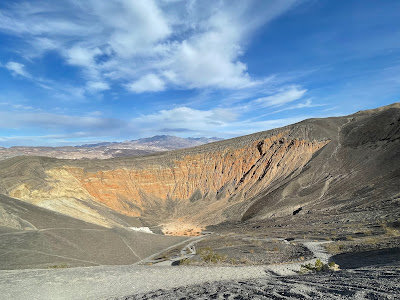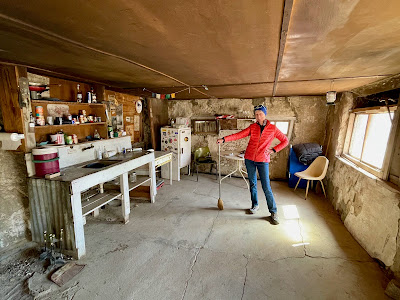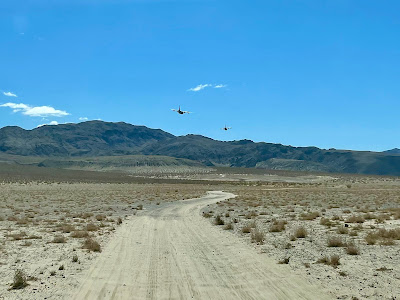 |
| Mono Lake and the White Mountains |
On Saturday morning (20 March 2021) we set off in the damp and the rain and made our way up I-80 to Tahoe and out to Spooner Summit and down to highway 395 into Nevada. By the time we had reached the Lake the bad weather was behind us and we had fine weather for the rest of the day. We drove down 395 through Bridgeport, past Mono Lake, which was looking spectacular, and on to Mammoth Lakes. At Mammoth we turned east on Benton Crossing Road and headed over to our overnight stop in Benton Hot Springs. Benton Hot Springs is an interesting place. It is just a few old buildings, now mostly deserted and derelict but it has a hotel and we had a room there for the night. It was the quirkiest hotel I have stayed in for a while. We had the cowboy room with a wonderful mural above the bed and all sorts of cowboy and Native American artifacts in the room.
 |
| Benton Hot Springs Hotel |
 |
| Benton Hot Springs |
The next morning we set off towards the northern entrance to Death Valley. We gassed up in Dyer and then entered the park via Eureka Valley. A couple of burritos strategically placed on the engine before we left our hotel provided us with a nice warm breakfast on our way into the Eureka Valley.
 |
| Eureka Dunes |
The Eureka Dunes at the southern end of Eureka Valley are quite tall and impressive - significantly larger than any of the other dunes in the park. From the Dunes we headed up towards Dedeckera Canyon and Steelhead Pass. As we passed by the south side of the dunes we were startled by a pair of C-130 Transport planes flying low, very low, over the road. The Air Force uses the valleys around Death Valley for its low altitude flight training.
Heading down the trail into the Saline Valley we came across a hiker. I first thought he was wearing a too short pair of shorts, but no, as we got nearer we found that he was not wearing any shorts at all - just a T shirt and a pair of hiking boots, nothing else. Death Valley attracts the strangest of people.
 |
| Saline Valley Hot Springs |
We set up camp for the evening at the Upper Saline Valley Hot Springs. There were quite a few folks there already so we found a more secluded spot to pitch our tent. We didn’t go into the hot springs as they seemed to be quite busy and there were way too many naked old men around. Instead we dined on a fine meal of Spaghetti Bolognese and retired to the tent. In the night I was awoken by a burro walking by the tent - he didn't come in. There are quite a few burros around in the valley. They were left there by the miners and they have been quite successful in their breeding. The park has a plan to remove them as they are considered non-native invasives.
 |
| Fine Dining in Saline Valley |
The next morning we packed up and prepared to drive south down the Saline Valley. Before we left camp we had a fun discussion and education on the ways of Hot Spring Life from Denis, a colorful and very chatty character who puttered around the springs on his motorbike.
The road south is a washboard road that is not much fun to drive on but the valley is beautiful in a Death Valley barren and extreme kind of way. We passed the site of an old tramway that was built in 1911 and operated until 1930, that transported salt gathered from the valley floor up and over into the Owens Valley where it was shipped further afield. Very little remains of the tramway now, just a few old towers out in the salt flats, but what an impressive operation that must have been.
 |
| Lippincott Pass down to Saline Valley |
At the foot of Lippincott pass we dined on another engine warmed burrito before making the ascent up the pass and over into the next valley, Racetrack Valley. In the bottom of this valley is a playa, the Racetrack, that displays a strange and unique phenomenon. There are several fairly large rocks that show tracks of their movement across the playa. The tracks of the stones are many yards long and for a long time no one knew how they were created. However, scientists have recently discovered it was a combination of ice, followed by the melting of the ice at a time of very strong winds with of course a very flat playa.
 |
| Tea Kettle Junction |
It was then more of the washboard road up to Ubehebe Crater. This is a magnificent volcanic crater created by an eruption of steam (a phreatic crater) and it is nearly ½ mile wide and some 700 ft deep. The date of the eruption is not clear but it may be quite recent - 700 to 2000 years ago.
 |
| Ubehebe Crater |
From Ubehebe we joined the tarmac road through the valley so we aired up and sped along through Furnace Creek and out towards Death Valley Junction. On the way we stopped at Zabriskie Point to view the beautiful erosional landscape there. It was close to sunset and the place was quite busy with everyone snapping a photo of the great light conditions at that time of day.
 |
| Zabriskie Point |
 |
| The Amargosa Opera House Hotel |
The hotel is struggling now and it is quite run down. Death Valley Junction is a long way from Death Valley itself and there is nothing else in the town. A non-profit is trying to keep the hotel alive but it needs a lot of upkeep and some serious renovation money to make it viable. That being said we enjoyed our stay in this most quirky of hotels. Sadly because of Covid the Opera House itself was closed so we could not see the murals that Marta painted in there.
 |
| The Amargosa Opera House |
Our next day we headed north from Death Valley Junction up towards Beatty. Beatty is an old mining town and it is the largest population center on the east side of Death Valley. It has a few hotels, a couple of casinos, gas stations but surprisingly no grocery store. I don’t think there are many fresh vegetables eaten in Beatty. After gassing up, we headed west and entered Titus Canyon. I had been to Titus Canyon a couple of times before, most notably to run the Death Valley Marathon in 2008, and I always enjoy it. The views at the head of the canyon are spectacular and the canyon itself is wonderful as it narrows down before emptying out into Death Valley itself.
 |
| Blowing Sand in Death Valley |
We stopped to examine a couple of mining operations on the way up Warm Springs Road, some perhaps quite recent, and then climbed over the pass into Butte Valley. Butte Valley is named after the striped rock butte that sticks up in the middle of the valley. I had hoped to stay that night at the Geologist’s Cabin that overlooks the valley but someone had already taken up residence there so we moved on. A short distance away is Stella’s Cabin and we stayed there. There are several of these cabins around the more remote spots in the Valley. Usually old miner’s cabins that have been retrieved from total deterioration by fellow off roaders. The idea being that they are made available on a first come first served basis with an understanding that you try and leave the place a little better than you found it. Stella’s Cabin had a wood stove and a good supply of wood, a table and sink for cooking, an old refrigerator (not functioning) for non perishable food storage and most of its windows were still intact. It provided a great shelter from the winds that night. The tent would not have been a good place.
 |
| Stella's Cabin |
The next morning was beautiful and calm and we dallied a long time over breakfast admiring the views over Butte Valley. Mary Ann did a wonderful job of sweeping out the cabin making it look a lot better and we left some food in the refrigerator for any subsequent visitors. The road from the cabin then went over Mengel Pass and dropped down into Goler Canyon.
 |
| Stella's Cabin |
Goler Canyon is the home of Barker Ranch, a one time ranch house that was first a miner’s cabin and then the retreat for a family, the Barkers, from Oklahoma. It is now more famous for being the place where Charles Manson was arrested back in 1969. Alas the once impressive looking ranch house burned down in 2009 and it is now only a shell.
 |
| The remains of Barker Ranch |
Surprisingly there was quite a lot of water down the lower part of Goler Canyon and it was nice to see some green trees and bushes for a change. On the way down the canyon we saw several burros wandering around and then a couple of big horned sheep. The latter were quite spectacular and didn’t seem too perturbed by our presence.
 |
| Bighorn Sheep |
The canyon empties into the lower end of the Panamint Valley and from there we drove north to Ballarat. There’s not much happening in Ballarat, though the store/trading post there has been cleaned up a little and the owner now sells a few trinkets and T-shirts. The truck belonging to Tex Watson (of Charles Manson gang fame) with the stars painted on the interior roof of the cab is still sitting there.
 |
| Wildrose Charcoal Kilns |
That was the end of our Death Valley adventure and we drove out of the park that evening through Panamint Springs up and over to highway 395 where we stayed the night in the very fine Trails Motel in Lone Pine. That evening we had our first meal inside a restaurant in over a year. It wasn’t a particularly good meal but it was nice to sit inside a restaurant for a change. The seating was limited and the waitress at least had her mask over her mouth, but sadly not over her nose.
The next day we awoke to a magnificent view from our hotel room over to the High Sierras (room no 5 at the Trails has the best view). The entire trip has been one great view after another and this one was surely one of the more remarkable. One of those peaks up there was Whitney, the highest point in the lower 48. We also awoke to the smell of patchouli blowing in the wind. The owner of the hotel, an Indian gentleman, was burning a clump of joss sticks outside his office - a nice touch.
 |
| The High Sierras behind the Alabama Hills near Lone Pine |
Driving north we skipped the Lone Pine Movie Museum, and the Manzanar Internment Camp and landed in Bishop at Schatt’s Bakery where we bought bread, sandwiches for lunch and had our breakfast outside the bakery. The bakery does an incredible trade even in these Covid days. The staff all looked over worked and over stressed however - perhaps it is not a great place to work.
Driving north on 385 I was hoping to get into the ghost town of Bodie. I have been there lots of times and it never fails to amaze me, and Mary Ann had never been so she needed to see it. The main road to Bodie was closed but I had hoped the southerly entrance from the north side of Mono Lake would be open. Alas they were working on the road and it was closed off. Plan B was to then try and find the miner’s cabin at Bass Camp so we set off into the hills to the east of Mono Lake. We bounced along for a while and Mary Ann had a taste of off road driving but Bass Camp was too far away so we abandoned that idea and turned back towards Mono Lake. We did see a lot of wild horses in this section so we did get to complete the trifecta of large Nevadan mammals on this trip - the burro, the bighorn sheep, and the wild horse.
.
 |
| Wild Horses |
We stayed this last night of our trip in Bridgeport where it was snowing. Poor old Bridgeport was struggling through the Covid pandemic. Most things were closed and when we walked out in the evening the only place open was the convenience store at the gas station. With the snow coming down it looked quite bleak.
Next morning we had one more attempt to get into Bodie, this time from the northern route but after climbing a good way up into the Bodie Hills and getting quite close to the town we decided to turn back. The snow was getting quite deep and there were no tracks going further up the road. We didn’t want to finish our trip by being marooned in the snow outside Bodie.
 |
| Snow in the Bodie Hills |
The drive up 395 to highway 50 was uneventful apart from a Bald Eagle sighting as we climbed up to Spooner Summit. We were home just after 2;00pm. Another great trip and the Land Cruiser performed wonderfully. Should I really sell it now?






No comments:
Post a Comment